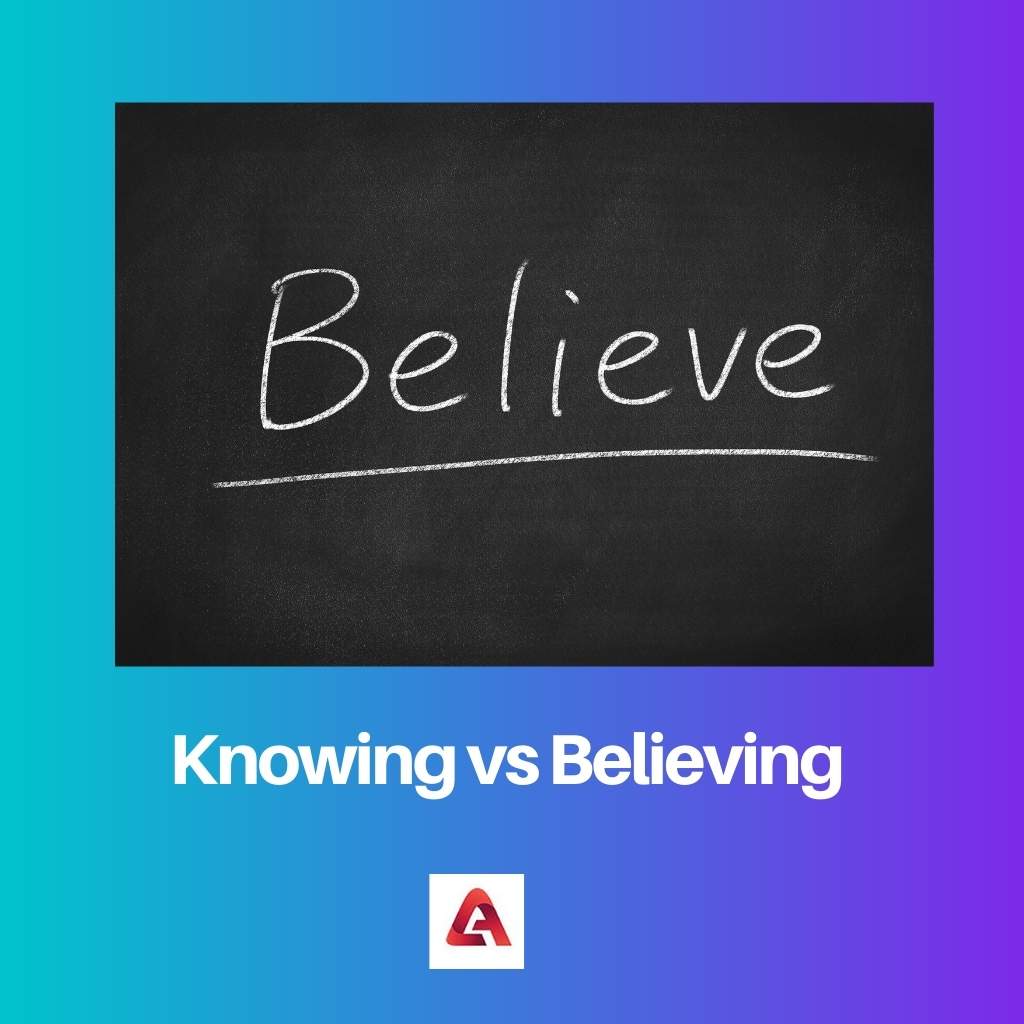Knowing and believing are two abstract concepts. They have a practical application in religious teachings across the world. To know refers to being sure of something. Believing, on the other hand, refers to firm convictions.
Although having knowledge and believing are different, they are confusing in everyday use. However, there are several differences between the terms that assure they are not the same.
Key Takeaways
- Knowing refers to having information backed up by evidence or personal experience.
- Believing refers to accepting something as true without evidence supporting it.
- Knowing is based on facts while believing is based on faith or personal convictions.
Knowing vs Believing
Knowing means having factual or experiential knowledge about something. It means having evidence or proof that something is true or exists. Knowing is based on evidence or facts. Believing is accepting something as true or real without necessarily having evidence or proof to support it. Belief can be based on personal experience, intuition, faith, or trust in someone or something.

To know means to perceive something directly. It refers to the knowledge that comes from within. When an individual knows something, it becomes a part of his existence.
Knowing doesn’t restrict but empowers an individual. The primary reason behind the same is that knowing comes without a doubt. Knowing is eternal.
To believe means to accept something as truth and have firm conviction. Unlike knowing, believing something doesn’t come from within an individual. Instead, it comes from outside an individual.
In addition, beliefs are mental exercises which are located in the mental realm. They comprise thinking and accepting ideas, values and beliefs. Thus, beliefs house the mental domain. Believing is transitory.
Comparison Table
| Parameters of Comparison | Knowing | Believing |
|---|---|---|
| Definition | To know means to perceive something directly. It refers to the knowledge that you are certain and sure about. | To believe means to accept something as true and have firm conviction. |
| Element of doubt | Knowing involves no doubt because it comes from within. It is a part of an individual’s existence. | Believing involves at least some degree of doubt because it comes from outside an individual. It may or may not be a part of an individual’s existence. |
| Longevity | Knowing is eternal because it doesn’t involve uncertainty. A person is sure about what he knows. | Believing is transitory because it involves a degree of doubt. A person may not be sure about what he believes. |
| Location | Knowing is located in the physical domain. It involves physical exercises. | Believing is located in the mental domain. It involves mental exercises. |
| Empowers/Restricts | Knowing empowers an individual due to the absence of doubt. It enables an individual to be confident in themselves. | Believing restricts an individual due to the presence of some degree of doubt. It doesn’t make an individual confident in themselves. |
| Comfort/Chaos | To know brings comfort in an individual’s life. It enables an individual to be calm and composed. | Belief may bring chaos in an individual’s life due to the uncertainty of opinions. |
What is Knowing?
To know means to perceive something directly. It refers to the knowledge that you are sure about and emerges from within an individual. It originates in the mental domain. However, it lies in the physical realm. There is no doubt attached to knowing as it comes from an individual’s own experiences.
When an individual knows something, it becomes a part of his existence. All the things that an individual is sure about come under the umbrella of knowing. To know includes all the information that an individual can hold with confidence. They are physical exercises.
Knowing doesn’t restrict but empowers an individual. The primary reason behind the same is that knowing comes without a doubt. An individual is sure about all that he knows.
Another significant characteristic of knowing is that it is eternal. What you know- such as what photosynthesis is or what is hyperbole- remains constant throughout life. It doesn’t change at any point in your life.
Knowing things brings comfort. For example, if you know you have a test next month, you’ll be relaxed while preparing for it. As a result, knowing reduces your fears. To know comes with shrewdness and awareness. It doesn’t correspond to blind trust in an idea, belief, or opinion.

What is Believing?
To believe means to accept something as true and have firm conviction. Unlike knowing, believing something doesn’t come from within an individual. Instead, it originates from outside an individual.
As a result, belief has an element of doubt attached to it. Beliefs held by one individual may not correspond with those held by another. Since beliefs have a degree of doubt in them, they will let you down.
Consider, for example, the belief that money is everything. Now, this belief may not validate in an environment where personal relationships are placed over monetary benefits and let you down.
In addition, beliefs are mental exercises which lie in the mental realm. They comprise thinking and accepting ideas, values and beliefs. Thus, beliefs house the mental domain.
Believing comes with an element of doubt. Consequently, an individual’s beliefs can restrict him/her. For instance, believing that limiting yourself to academics is the best option may hold you from exploring yourself and your skills. Believing invites gullibility. It can trap an individual in scams or puzzling situations.
An idea, opinion or notion is all transitory. Beliefs change as an individual grows and evolves. There are several beliefs that you may have had in the past. But, as time passed by, you no longer associate yourself with those ideas.

Main Differences Between Knowing and Believing
- Knowing refers to knowledge about something. On the other hand, believing refers to a firm conviction and trust in an idea, value or belief.
- Knowing involves no doubt because it comes from within. In contrast, believing involves some degree of doubt because it comes from outside an individual.
- Knowing is located in the physical realm, whereas believing is located in the mental domain.
- Knowing empowers an individual due to the absence of doubt. However, believing restricts an individual due to the presence of some degree of uncertainty.
- Knowing is eternal. On the other hand, believing in opinions is all transitory. Beliefs change as an individual grows and evolves.
- Knowing things brings comfort. In contrast, believing will let you down in different situations.


Knowing is associated with facts, evidence, and certainty. It empowers an individual due to the absence of doubt. Believing, on the other hand, involves mental exercises and has an element of doubt, which may restrict an individual and bring chaos.
That’s right, knowing brings comfort and empowers an individual, while believing may not make an individual confident in themselves due to the uncertainty of opinions.
Indeed, knowing is located in the physical domain and comes from an individual’s experiences, which is connected to facts and certainty. Believing, however, is located in the mental domain and involves some degree of doubt, which may bring chaos.
Knowing is eternal and brings comfort due to its association with facts and evidence. It empowers an individual due to the absence of doubt. On the contrary, believing involves a degree of doubt and may bring chaos due to the uncertainty of opinions.
Exactly, knowing empowers an individual and doesn’t correspond to blind trust. Believing may restrict an individual due to the presence of doubt, which may cause uncertainties.
Knowing comes from an individual’s experiences and is located in the physical domain. It doesn’t restrict but empowers, and it’s eternal. Believing comes from outside and may not make an individual confident in themselves due to the presence of some degree of doubt.
That’s correct. Knowing is associated with facts and certainty, which brings comfort and doesn’t correspond to blind trust. Believing, on the other hand, has an element of doubt, which may cause uncertainties and restrict an individual.
The comparison between knowing and believing is quite enlightening. Knowing doesn’t restrict but empowers, whereas believing may bring chaos due to the uncertainty of opinions. Knowing comes from within and is located in the physical domain, while believing originates from outside and is located in the mental domain.
Exactly, knowing doesn’t correspond to blind trust and reduces fears, which brings comfort. Believing has an element of doubt and may not make an individual confident in themselves.
Knowing comes from within and is sure about an individual’s experiences. It doesn’t restrict but empowers, and it’s eternal. Believing comes from outside and has an element of doubt, which may bring chaos due to uncertainties. It’s located in the mental domain.
Exactly, knowing is related to facts and certainty, which brings comfort. Believing, on the other hand, involves some degree of doubt, which may not make an individual confident in themselves.
To know means to perceive something directly, and it’s associated with knowledge that a person is certain and sure about. It empowers an individual due to the absence of doubt and enables them to be confident. On the other hand, believing is transitory and involves a degree of doubt. It may restrict an individual and bring chaos due to the uncertainty of opinions.
Yes, knowing comes from within an individual and is connected to the physical domain, while believing comes from outside and is related to the mental domain. Knowing is eternal and brings comfort, while believing may cause chaos due to the uncertainty of opinions.
The main difference between knowing and believing is that knowing is based on facts or experience and is located in the physical domain, while believing comes from outside an individual and is based on personal convictions. Knowing is eternal and doesn’t involve doubt, which gives comfort to the individual. On the other hand, believing involves some degree of doubt and may cause chaos in an individual’s life due to the uncertainty of opinions.
That’s correct. Knowing is related to facts while believing is connected to personal convictions and may bring chaos due to the uncertainty of opinions.
Knowing is based on evidence or facts and brings comfort and empowerment. It doesn’t involve doubt and is eternal. Believing, however, involves a degree of doubt and may cause chaos due to uncertainties. It’s located in the mental domain and doesn’t make an individual confident in themselves.
Absolutely, knowing brings comfort and doesn’t correspond to blind trust. Believing, on the other hand, may restrict an individual and cause uncertainties due to doubts.
Correct, knowing is related to facts and evidence and doesn’t restrict but empowers. Believing, however, involves some degree of doubt and may bring chaos due to the uncertainty of opinions, which doesn’t make an individual feel confident.
Knowing is based on facts and doesn’t involve doubt, while believing is based on faith or personal convictions and has an element of doubt. Knowing empowers an individual and brings comfort, while believing may bring chaos due to the uncertainty of opinions.
I agree, knowing and believing are different in terms of facts, evidence, and certainty. Knowing doesn’t restrict but empowers, whereas believing may cause chaos in an individual’s life due to uncertainties.
Yes, knowing is eternal and brings comfort. It’s related to facts and evidence, while believing is transitory and may not make an individual confident in themselves.
Knowing doesn’t correspond to blind trust and brings comfort, while believing involves mental exercises and has an element of doubt. Knowing is located in the physical domain, whereas believing is located in the mental domain.
That’s correct. Knowing comes from within an individual and is based on evidence or proof, which doesn’t involve doubt. Believing, on the other hand, may not make an individual confident in themselves due to the presence of some degree of doubt.